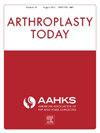Outcomes of Primary Total Hip Arthroplasty Using Custom Femoral Stems in Patients With Secondary Hip Osteoarthritis: A Systematic Review
IF 1.5
Q3 ORTHOPEDICS
引用次数: 0
Abstract
Background
This systematic review aims to evaluate the effectiveness and safety of custom femoral stems in primary total hip arthroplasty (THA) for patients with secondary osteoarthritis with abnormal hip anatomy.
Methods
Following Preferred Reporting Items for Systematic Reviews and Meta-Analyses (PRISMA) guidelines, databases were systematically searched for studies published on primary THA utilizing custom femoral stems. Inclusion criteria were studies on patients with secondary osteoarthritis receiving custom stems, with outcomes including implant survival, revision rates, and functional scores. Data were extracted from eligible studies, with a focus on overall and cause-specific revision rates.
Results
A total of 689 studies were screened, 13 met the inclusion criteria, encompassing 806 patients and 951 custom THA procedures. The collective follow-up period averaged 11.6 years, with a mean age of 44.6 years. The mean reoperation and revision rates were 6.9% (95% confidence interval [CI]: 3.24-10.13) and 8.25% (95% CI: 4.02-12.47), respectively. The mean intraoperative fracture rate was 3.23% (95% CI: 1.35-5.11), and the mean postoperative leg length discrepancy was 4.25 mm (95% CI: 1.57-6.93). The mean improvement of postoperative Harris Hip Score was 40.32 (range 30-56).
Conclusions
Custom femoral stems in primary THA demonstrate promising results in terms of implant survival and functional outcomes for patients with complex hip anatomy due to secondary osteoarthritis. These findings support the consideration of custom implants as a viable option for this patient demographic, although further research is warranted for long-term outcomes and direct comparisons with standard prostheses.
继发性髋关节骨性关节炎患者使用定制股骨柄进行初次全髋关节置换术的疗效:系统回顾
背景本系统性综述旨在评估定制股骨柄在髋关节解剖结构异常的继发性骨关节炎患者的初次全髋关节置换术(THA)中的有效性和安全性。方法根据系统性综述和荟萃分析首选报告项目(PRISMA)指南,系统地检索了数据库中已发表的关于使用定制股骨柄的初次全髋关节置换术的研究。纳入标准是关于接受定制股骨柄的继发性骨关节炎患者的研究,研究结果包括植入物存活率、翻修率和功能评分。从符合条件的研究中提取数据,重点关注总体翻修率和特定病因翻修率。结果 共筛选出 689 项研究,13 项符合纳入标准,涉及 806 名患者和 951 例定制 THA 手术。随访时间平均为 11.6 年,平均年龄为 44.6 岁。平均再手术率和翻修率分别为 6.9%(95% 置信区间 [CI]:3.24-10.13)和 8.25%(95% 置信区间 [CI]:4.02-12.47)。术中平均骨折率为3.23%(95% CI:1.35-5.11),术后平均腿长差异为4.25毫米(95% CI:1.57-6.93)。结论:对于因继发性骨关节炎导致髋关节解剖结构复杂的患者,定制股骨柄在初次 THA 中的植入物存活率和功能结果方面显示出良好的前景。这些研究结果支持将定制假体作为这类患者的一种可行选择,但还需要进一步研究长期疗效,并与标准假体进行直接比较。
本文章由计算机程序翻译,如有差异,请以英文原文为准。
求助全文
约1分钟内获得全文
求助全文
来源期刊

Arthroplasty Today
Medicine-Surgery
CiteScore
2.90
自引率
0.00%
发文量
258
审稿时长
40 weeks
期刊介绍:
Arthroplasty Today is a companion journal to the Journal of Arthroplasty. The journal Arthroplasty Today brings together the clinical and scientific foundations for joint replacement of the hip and knee in an open-access, online format. Arthroplasty Today solicits manuscripts of the highest quality from all areas of scientific endeavor that relate to joint replacement or the treatment of its complications, including those dealing with patient outcomes, economic and policy issues, prosthetic design, biomechanics, biomaterials, and biologic response to arthroplasty. The journal focuses on case reports. It is the purpose of Arthroplasty Today to present material to practicing orthopaedic surgeons that will keep them abreast of developments in the field, prove useful in the care of patients, and aid in understanding the scientific foundation of this subspecialty area of joint replacement. The international members of the Editorial Board provide a worldwide perspective for the journal''s area of interest. Their participation ensures that each issue of Arthroplasty Today provides the reader with timely, peer-reviewed articles of the highest quality.
 求助内容:
求助内容: 应助结果提醒方式:
应助结果提醒方式:


